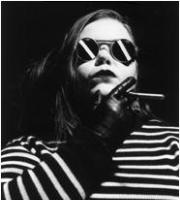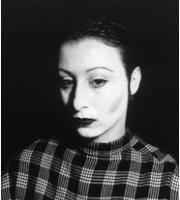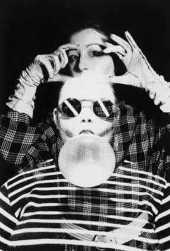| Requiem pour le XXeme siècle (cycle de l'ange) |
|
Expérimental. France. 1994. Couleur / N&B. 14'. Sans paroles. Distr. : Light Cone
|
Requiem pour le XXeme siècle, est le 18e volet du Cycle de l'Ange, que nous réalisons depuis 1985: installations, performances multimédia, photographies, pièces sonores, créations radiophoniques, livre d'artiste... Un ensemble d'œuvres construit autour d'une photographie médicale d'hermaphrodite que nous avons associée au concept d'Ange. Requiem pour le XXeme siècle est un manifeste contre la guerre, une élégie.
La photographie est mise en relation avec des images appartenant à la mémoire publique de notre siècle: métrage trouvé - extraits d'actualités de la deuxième guerre mondiale retravaillés et transformés par divers procédés optiques et électroniques. Cette guerre a été un condensé de violences (destruction écologique et biologique, racisme, purification ethnique, persécution de la différence...) que d'autres guerres, actuelles, perpétuent. Une scène métaphorique de toutes les guerres passées, présentes ou à venir.
« ...Tel devra être l'aspect que présente l'Ange de l'Histoire. Son visage est tourné vers le passé. Là où à notre regard à nous semble s'échelonner une suite d'événements, il n'y a qu'un seul qui s'offre à ses regards à lui: une catastrophe sans modulation ni trêve, amoncelant les décombres et les projetant éternellement devant ses pieds... » Walter Benjamin.
Cette œuvre est construite à la limite et sur les croisements de différentes technologies de l'image (films Super 8 et 16mm, photographie, infographie, vidéo).
"The Angel Cycle" (1985-) has its starting point at a medical photograph of a hermaphrodite that we have associated to the concept of the Angel. Up to now it includes more than twenty works: multimedia performances and installations, photo-sculptures, sound pieces, radio broadcasts, an artist's book, computer animations, video tapes.
"Requiem pour le XXe siècle" brings the "Angel" photograph in relation with archival footage from 2nd World War. It is an anti-war manifesto, an elegy. As a body of difference, a stranger, the "Angel" figure acquires an ambiguous status of observer, witness, victim or judge.
This video crosses technologies: Super 8 and 16mm film, photography, computer graphics and video processing.
|
|
© 1994 Klonaris/Thomadaki |
|
 © Klonaris/Thomadaki |
|
Maria Klonaris (1950-2014) |
|
D'origine grecque, née au Caire, Egypte, Maria Klonaris a fait des études d'arts plastiques et de scénographie à l'Ecole Supérieure des Beaux Arts d'Athènes, de lettres anglaises à l'université d'Athènes, d'Egyptologie à l'Ecole Pratique des Hautes Etudes, de cinéma experimental, esthétique et sciences de l'art à l'université Paris I, Sorbonne. Elle a acquis une formation en infographie à l'Ecole Nationale Supérieure des Arts Décoratifs.
Born in Cairo, Egypt, has studied fine arts at the National School of Fine Arts Athens, English literature at the University of Athens, egyptology at the Ecole Pratique des Hautes Etudes, Paris, experimental film, art history and philosophy of art at the University Paris I, Sorbonne, computer graphics at the National School of Decorative Arts, Paris.
|
|
Katerina Thomadaki |
|
 © Klonaris/Thomadaki |
Née à Athènes, Grèce, elle a suivi des études de lettres et de philosophie à l'université d'Athènes, puis des études de théorie de théâtre à l'université Paris III, de cinéma experimental ainsi que d'esthétique et sciences de l'art à l'université Paris I, Sorbonne. Elle a acquis une formation en infographie à l'Ecole Nationale Supérieure des Arts Décoratifs à Paris. Katerina Thomadaki est professeur associé à l'université Paris I, Sorbonne.
Born in Athens, Greece, has studied literature and philosophy at the University of Athens, theater theory at the University Paris III, Sorbonne, philosophy of art at the University Paris I, Sorbonne, computer graphics at the National School of Decorative Arts, Paris. Katerina Thomadaki teaches media art at the University Paris I, Sorbonne.
|
 © Klonaris/Thomadaki |
|
Maria Klonaris (1950-2014) & Katerina Thomadaki |
www.klonaris-thomadaki.net |
A partir de leur installation à Paris en 1975, Maria Klonaris forme avec Katerina Thomadaki une paire indissociable. Klonaris/Thomadaki conçoivent de vastes cycles qui courent sur plusieurs années et se développent dans plusieurs disciplines artistiques : Tétralogie corporelle, Cycle de l'Unheimlich (autour de l'« inquiétante étrangeté » du féminin), Cycle de l'Hermaphrodite, Rêve d'Electra, Série Portraits, Cycle de l'Ange, Désastres sublimes, Les Jumeaux... Avec ces figures récurrentes proprement hors normes, elles questionnent la frontière entre les sexes.
Bien avant l'éclosion du mouvement 'queer', l'œuvre de Klonaris/Thomadaki, nourrie de pensée critique (psychanalyse, philosophie, sociologie, pensée féministe...), se penche sur le genre et l'intersexualité.
Since their installation in Paris in 1975, Maria Klonaris and Katerina Thomadaki form an inseparable pair. Klonaris and Thomadaki create vast cycles lasting several years and grow in several artistic disciplines: "Tétralogie Corporelle," "Cycle of the Unheimlich" (around the "uncanny" of the female), "The Hermaphrodite Cycle," "The Angel Cycle," "Sublime Disasters," "The Twins"... With these repeated nonstandard figures, they question the boundary between the sexes. Long before the emergence of queer movement, the work of Klonaris / Thomadaki nourished by critical thought (psychoanalysis, philosophy, sociology, feminist thought ...), focuses on gender and intersex.
|
|